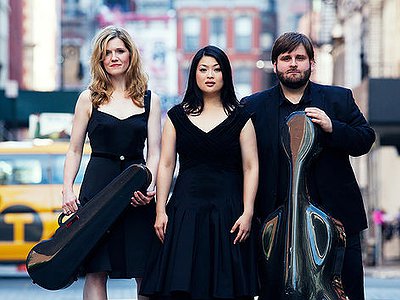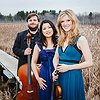There are many descriptions of the ideal state of mind for being creative. What is it like for you? What supports this ideal state of mind and what are distractions? Are there strategies to enter into this state more easily?
Mikhail Veselov, cello: In rehearsals, we try to avoid distractions, and approach it with a sense of discovery and fun. It allows for a more focused, productive, and enjoyable rehearsal. We are always listening to each other in a critical way because we want to help one another to be at our best. Rehearsals are full of collaborative ideas and trying many different things. Having an opinion, but also being open-minded is important and helps us to come up with our group interpretation.
During performance, you need a different kind of focus. You have to be able to react to what your colleagues are doing, to be present with one another and the moment and able to tune out the critical thoughts and judgment of your own that may creep in. Kind of like great improv actors, ideally you want to have a kind of a “yes, and“ attitude. You want to be inspired by your colleagues and inspire them in the moment, too.
Distractions are always there, both in rehearsal and performance. We always have many emails to respond to and projects to discuss. During performance, it could be anything from a noisy audience member to your own critical thoughts or something else that happened that day trying to distract you. But if you can try to come back to the music at hand, no matter what, that’s the most important thing. For me, the most helpful way to come back to being present is to put music in the center, to come back to the emotion behind it, to listen to my colleagues’ playing and allow myself to be inspired by their expression and musicality.
How do you make use of technology? In terms of the feedback mechanism between technology and creativity, what do humans excel at, what do machines excel at?
Mikhail Veselov, cello: As a classical piano trio we are in a great position of not requiring a lot of technology. All of our instruments are acoustic so even if power is out, we can still make music. However, we do use and love technology in many aspects of our work. We find that it is so helpful to be able to record ourselves with a device we have in our pockets at all time, and get instant feedback that way.
Additionally, technology has of course changed the way your music can be heard and provided since it provides instant access to a wide audience around the world, all at the touch of a button. So many concerts now are live-streamed and our CD recordings are available for digital download and on streaming platforms. This makes it so much easier to share your work and grow your audiences. It does present a challenge to get people to come to live performance of course, but we really believe that in spite of all the technological advances, nothing can replace the actual physical experience of being at a live concert.
Collaborations can take on many forms. What role do they play in your approach and what are your preferred ways of engaging with other creatives through playing together or just talking about ideas?
Anna Williams, violin: We absolutely love collaborating and constantly seek new opportunities! We have had the privilege to work with dancers, choreographers, film makers, visual artists, architects, graphic designers, and others. We always feel like we learn so much from how someone else might hear the music we love and how that translates into other mediums. For instance, if we hear something as lamenting but a dancer provides a jagged movement to a particular phrase, we can’t help but feel that and it enriches our interpretation and becomes a part of how we experience that moment going forward.
How is preparing music, playing it live and recording it for an album connected? What do you achieve and draw from each experience personally? How do you see the relationship between improvisation and composition in this regard?
Eri Nakamura, piano: When we perform live we try to be very present and react in the moment. We get a lot of energy from the audience and feel it really is an exchange between not just the three of us but between our trio and the audience. You only get one chance, and then the moment passes.
During recording sessions, however, we get to do many takes and – although it is a great opportunity to “get things right” – it requires so much energy every time we do a take, each take given the same energy as a performances, we always strive to create a live performance feeling in the recording studio and we imagine the energy that we get from the live audience when we record.
How do you see the relationship between the 'sound' aspects of music and the 'composition' and 'performance' aspects? How do you work with sound and timbre?
Mikhail Veselov, cello: We always pay a lot of attention to the sound. We treat the sound as a color palette and find that each piece has its own range of colors and sound. For example, the kind of sound we strive for in Piazzolla’s music is completely different than what we are trying to create in Roussel’s piano trio. If I had to compare, Piazzolla is more like a bright oil painting, with lots of textures and bold, bright primary colors, while Roussel consists of softer, pastel, more transparent colors. It’s all part of the challenge of each piece that makes each experience so unique and can be so fulfilling.
Our sense of hearing shares intriguing connections to other senses. From your experience, what are some of the most inspiring overlaps between different senses - and what do they tell us about the way our senses work? What happens to sound at its outermost borders?
Mikhail Veselov, cello: Music can evoke so many senses. For example, one of the pieces on our latest album Celebrating Piazzolla is the Estaciones Porteñas. This piece really transports its listener to Buenos Aires. Certain sound effects like chicharra, when bow is placed on the wrapping of the string below the bridge, makes you feel itchy and unsettled. Those moments are supposed to call to mind the insects of Argentina. Then there is the sul ponticello effect, which can absolutely make you shiver, almost as though it were a gust of cold air. We really feel music and sound has a unique ability to affect in you in so many ways and transport you to another place.





